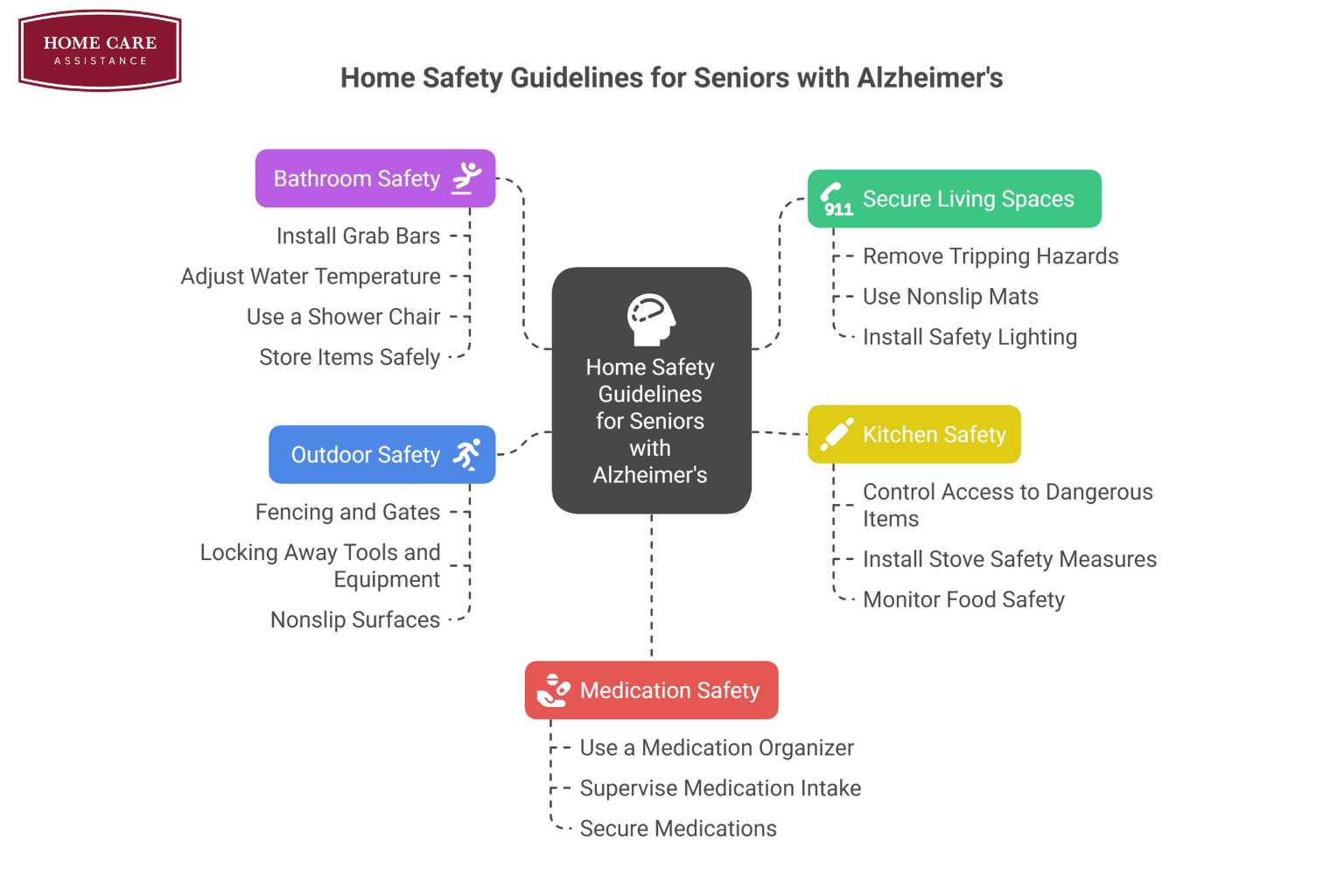
Caring for a senior loved one with Alzheimer’s disease comes with unique challenges, particularly when it comes to ensuring safety at home. People living with Alzheimer’s may experience memory loss, confusion, and impaired judgment, which can increase their risk of accidents. By implementing practical safety measures, you can create a supportive and secure environment for your loved one.
Secure Living Spaces
Ensuring your loved one’s living spaces are free of hazards is a vital step in promoting his or her safety. Here’s how you can secure key areas of the home:
- Remove tripping hazards – Clear walkways of clutter, cords, and loose rugs that could pose a tripping risk. Ensure furniture is arranged to promote easy navigation.
- Use nonslip mats – Place nonslip mats in areas prone to moisture, such as the kitchen and bathroom. This reduces the risk of falls.
- Install safety lighting – Use nightlights in hallways and rooms to enhance visibility, especially during the night. Motion-sensor lighting can also be beneficial.
One of the most challenging tasks of helping an elderly relative age in place safely and comfortably is researching agencies that provide homecare. Turn to Home Care Assistance for reliable, high-quality in-home care for aging adults. We offer 24-hour live-in care for seniors who require extensive assistance, and we also offer respite care for family caregivers who need a break from their caregiving duties.
Make the Bathroom Safer
The bathroom is one of the most dangerous areas for seniors with Alzheimer’s due to slippery surfaces. Here are measures to make bathrooms safer:
- Install grab bars – Place grab bars in the shower, near the bathtub, and beside the toilet to provide extra support.
- Adjust water temperature – Set your water heater to a maximum of 120°F (48°C) to prevent accidental burns from hot water.
- Use a shower chair – A shower chair adds stability and reduces the chance of slips during baths.
- Store items safely – Keep sharp objects, medications, and cleaning supplies locked away or out of reach.
Address Kitchen Safety Concerns
The kitchen poses unique risks for individuals with Alzheimer’s, but a few adjustments can mitigate potential hazards:
- Control access to dangerous items – Store knives, scissors, and appliances like blenders in locked cabinets or drawers.
- Install stove safety measures – Use appliance locks or remove knobs from the stove when not in use to prevent accidental burns or fires.
- Monitor food safety – Check expiration dates on food products and immediately discard anything spoiled. Label commonly used items to make them easy to locate.
There are a variety of age-related health conditions that can make it more challenging for seniors to live independently. However, many of the challenges they face can be easier to manage if their families opt for professional at-home care. Barrie families can rely on expertly trained caregivers to keep their loved ones safe and comfortable while aging in place.
Create a Safe Outdoor Environment
Spending time outdoors can be beneficial for individuals with Alzheimer’s, but outdoor areas should also be secured to ensure safety:
- Fencing and gates – Install fences and secure gates to prevent wandering from the property.
- Locking away tools and equipment – Keep gardening tools, lawn equipment, and potentially harmful substances in locked sheds or storage units.
- Nonslip surfaces – Check sidewalks, driveways, and patios for nonslip surfaces to prevent falls.
Develop a Plan for Medication Safety
Proper organization of medications is essential for individuals with Alzheimer’s. Mismanagement can lead to serious health risks, but with the right systems in place, you can ensure safe usage:
- Use a medication organizer – Pill organizers can ensure the right dosage is taken at the right time. Choose one with labeled compartments for each day and time.
- Supervise medication intake – Provide assistance during medication times to ensure doses aren’t skipped or doubled.
- Secure medications – Keep all medications in a locked cabinet to prevent accidental ingestion.
If your senior loved one has Alzheimer’s and needs help managing daily tasks, reach out to Home Care Assistance, a leading provider of Alzheimer’s care. Barrie Home Care Assistance provides reliable caregivers around the clock to help your loved one age in place safely and comfortably while living with Alzheimer’s disease. We will work with you to create a customized home care plan that’s suited for your loved one’s unique needs. Call the Home Care Assistance team at 647-970-3803 today.
